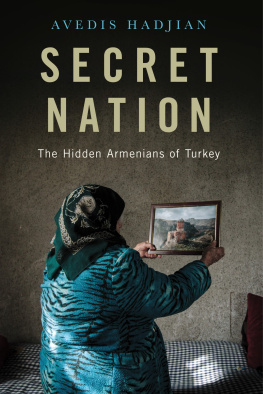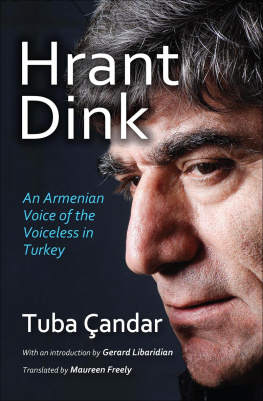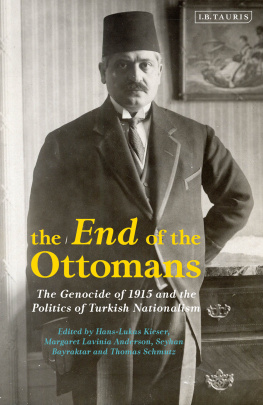The Politics of Naming the Armenian Genocide
Armenians in the Modern and Early Modern World
Recent decades have seen the expansion of Armenian Studies from insular history to a broader, more interactive field within an inter-regional and global context. This series, Armenians in the Modern and Early Modern World, responds to this growth by promoting innovative and interdisciplinary approaches to Armenian history, politics, and culture in the period between 1500-2000. Focusing on the geographies of the Mediterranean, Middle East, and Contemporary Russia [Eastern Armenia], it directs specific attention to imperial and post-imperial frameworks: from the Ottoman Empire to Modern Turkey/Arab Middle East; the Safavid/Qajar Empires to Iran; and the Russian Empire to Soviet Union/Post-Soviet territories.
Series Editor
Bedross Der Matossian, University of Nebraska, Lincoln, USA
Advisory Board
Levon Abrahamian, Yerevan State University, Armenia
Sylvie Alajaji, Franklin & Marshal College, USA
Sebouh Aslanian, University of California, Los Angeles, USA
Stephan Astourian, University of California, Berkley, USA
Houri Berberian, University of California, Irvine, USA
Talar Chahinian, University of California, Irvine, USA
Rachel Goshgarian, Lafayette College, USA
Ronald Grigor Suny, University of Michigan, USA
Sossie Kasbarian, University of Stirling, UK
Christina Maranci, Tufts University, USA
Tsolin Nalbantian, Leiden University, the Netherlands
Anna Ohanyan, Stonehill College, USA
Hratch Tchilingirian, University of Oxford, UK
Published and Forthcoming Titles
The Politics of Naming the Armenian Genocide: Language, History and Medz Yeghern, Vartan Matiossian
Picturing the Ottoman Armenian World: Photography in Erzerum, Kharpert, Van and Beyond, David Low
Words are perverted by half-educated ideologues, divested of their ordinary meaning, and thrown left and right to the flock of submissive followers, who accept them as supreme political truth.
Editorial of Droshak, April 1909
In 2001, during a visit to Armenia, Pope John Paul II used Medz (Great) Yeghern, the proper name for the annihilation of the Armenian population in the Ottoman Empire starting in 1915. His mention in a prayer at the memorial in Yerevan catapulted the Armenian proper name for the genocide to the global stage. Successive non-Armenian utilizations of the name mostly tended to avoid the legal term genocide and rewrite facts. To this effect, the word yeghern was divested of its ordinary legal meaning and Medz Yeghern was weaponized as verbal chaff (Nadezhda Mandelstam dixit) or, even worse, fresh grist for the mill of linguistic and historical revisionism.
Unexpectedly, the perversion of words found willful partners in the fertile ground of uninformed opinion and its flock of followers. Armenians, enmeshed in the web of genocide denial and anxiety for recognition, accepted the distortion of Medz Yeghern as political truth, failing to uphold the name of their own destruction.
The vicious circle generated by two strange bedfellows, misrepresentation and substandard knowledge, motivated me enough to write two blog entries and a couple of online comments between 2010 and 2012.
I did not intend to engage in a full critique of the glaring contempt for the testimony of language. My strong belief that the symbolic year 1915 represents neither the criminal beginning of Armenian history nor the catastrophic end of Armenian culture and my scholarly interests had positioned me at a healthy distance from the black hole of genocide, even though the proper name Medz (Great) Yeghern appeared in my research, writing, and translations with some frequency.
However, serendipity intervened.
Marginal as they were, those comments found an alert reader who reached out to share his concerns. I am deeply indebted to Donald Abcarian for vanquishing my reluctance to engage in a fulsome study of the use and abuse of Medz Yeghern, for which he did not spare his generous advice and assistance.
When I published the first of a series of eleven essays (201213) thanks to Khatchig Mouradian, then the editor of The Armenian Weekly, I was already mulling the idea of giving them an afterlife. As I followed their impact, both explicit and implicit, the initial intention of producing a slightly revised version of those essays took a life of its own and, eight years later, became a book written anew.
I am thankful to many other friends, colleagues, and acquaintances around the world, both named and unnamed, for their encouragement and support. Artsvi Bakhchinyan, Melissa Bilal, Talar Chahinian, Lerna Ekmekiolu, Hagop Gulludjian, Avedis Hadjian, Marc Mamigonian, Jennifer Manoukian, Razmik Panossian, and Talin Suciyan read different drafts and offered much-valued criticism and suggestions; Marc Nichanian and Archbishop Boghos Levon Zekiyan refined my grasp of certain points through our correspondence and conversations; Sevan Deirmendjian, Ara Sanjian, and Sassoun Simonian brought sources to my attention, and Harutiun Gobel, Narine Petrosyan, and Zaven Torikian helped locate others. Indeed, I am far from having covered the primary and secondary literature in their entirety, or read through all the nuances. The discoveries along this journey served to both enhance and correct some of my initial notions, but all views are my own and any shortcomings remain my responsibility.
I benefited greatly from access to the New York Public Library, the Shnorhali Library of the Eastern Prelacy of the Armenian Apostolic Church (New York), the Krikor and Clara Zohrab Information Center of the Diocese of the Armenian Church of America (Eastern) (New York), the Bergen County Cooperative Library System (New Jersey), and the library of the Armenian Missionary Association of America (Paramus, New Jersey). It would not have been the same, however, without the libraries of the National Association for Armenian Studies and Research (Belmont, Massachusetts), the National Library of Armenia, the Museum of Literature and Art Yeghishe Charents (Yerevan), the Catholicosate of the Great House of Cilicia (Antelias, Lebanon), and the Haigazian University (Beirut). The online collections of the National Library of Armenia, the National Academy of Sciences of Armenia, the Association pour la Recherche et lArchivage de la Mmoire Armnienne (ARAM), the Digital Library of Armenian Literature, the Nayiri library of electronic dictionaries, as well as the blog Grahavak were also extremely useful along with standard sources like Google Books and Hathi Trust.
I would like to express my gratitude to Bedross Der Matossian, series editor, and the advisory board for their decision to welcome this book as the inaugural publication of the Armenians in the Modern and Early Modern World series, as well as to the three anonymous reviewers for their comments and suggestions. My thanks also go to Rory Gormley, commissioning editor for Middle East Studies at I.B. Tauris, for shepherding the process, along with editorial assistant Yasmin Garcha and everyone else, known and unknown, who contributed to bring this project to fruition.






